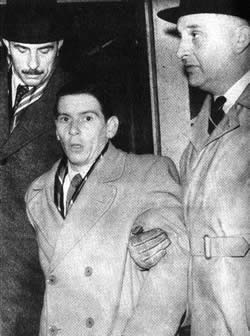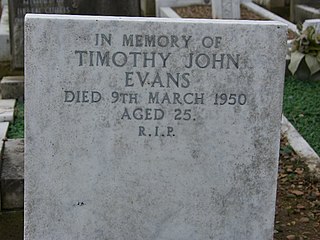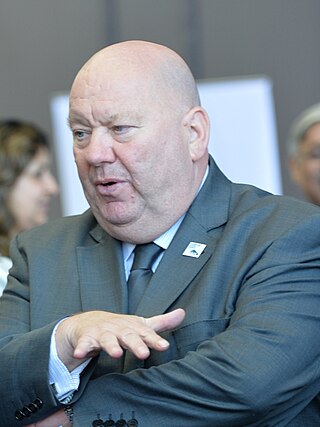
The Hillsborough disaster was a fatal crowd crush at a football match at Hillsborough Stadium in Sheffield, South Yorkshire, England, on 15 April 1989. It occurred during an FA Cup semi-final between Liverpool and Nottingham Forest in the two standing-only central pens within the Leppings Lane stand allocated to Liverpool supporters. Shortly before kick-off, police match commander David Duckenfield ordered exit gate C to be opened in an attempt to ease crowding, which led to an influx of supporters entering the pens. This resulted in overcrowding of those pens and the fatal crush; with a total of 97 fatalities and 766 injuries, the disaster is the deadliest in British sporting history. Ninety-four people died on the day; one more died in hospital days later, another in 1993, and in 2021, a 97th who had suffered irreversible brain damage on the day. The match was abandoned and restaged at Old Trafford in Manchester on 7 May 1989; Liverpool won and went on to win that season's FA Cup.

The murder of Wendy Sewell was committed on 12 September 1973. Wendy Sewell, a 32-year-old legal secretary from Bakewell, Peak District in Derbyshire was found beaten, sexually assaulted and murdered. In 1974, 17-year-old Stephen Downing was convicted of the murder of Sewell. Following a campaign by a local newspaper led by Don Hale, in which Sewell was purported to be promiscuous, Downing's conviction was overturned in 2002. The case is thought to be the longest miscarriage of justice in British legal history, and attracted international media attention.

Timothy John Evans was a Welshman who was wrongfully accused of murdering his wife Beryl and infant daughter Geraldine at their residence in Notting Hill, London. In January 1950, Evans was tried and convicted of the murder of his daughter, and on 9 March he was executed by hanging.

A miscarriage of justice occurs when an unfair outcome occurs in a criminal or civil proceeding, such as the conviction and punishment of a person for a crime they did not commit. Miscarriages are also known as wrongful convictions. Innocent people have sometimes ended up in prison for years before their conviction has eventually been overturned. They may be exonerated if new evidence comes to light or it is determined that the police or prosecutor committed some kind of misconduct at the original trial. In some jurisdictions this leads to the payment of compensation.
The West Midlands Serious Crime Squad was a police unit in the English West Midlands which operated from 1974 to 1989. It was disbanded after an investigation into allegations of incompetence and abuse of power on the part of some of the squad's members. Some of this misconduct resulted in wrongful convictions, including the high-profile case of the Birmingham Six. The sister Regional Crime Squad based at Bilston was responsible for the investigation of the Bridgewater Four.
Barry Michael George is an English man who was found guilty of the murder of English television presenter Jill Dando and whose conviction was overturned on appeal.

The M62 coach bombing, sometimes referred to as the M62 Massacre, occurred on 4 February 1974 on the M62 motorway in northern England, when a 25-pound (11 kg) Provisional Irish Republican Army (IRA) bomb hidden inside the luggage locker of a coach carrying off-duty British Armed Forces personnel and their family members exploded, killing twelve people and injuring thirty-eight others aboard the vehicle.
Steven Allan Avery is an American convicted murderer from Manitowoc County, Wisconsin, who had previously been wrongfully convicted in 1985 of sexual assault and attempted murder. After serving 18 years of a 32-year sentence, Avery was exonerated by DNA testing and released in 2003, only to be charged in another murder case two years later.
Wrongful execution is a miscarriage of justice occurring when an innocent person is put to death by capital punishment. Opponents of capital punishment often cite cases of wrongful execution as arguments, while proponents argue that innocence concerns the credibility of the justice system as a whole and does not solely undermine the use of the death penalty.
On the evening of 19 March 1949, in Cameo cinema in Liverpool, England, a double murder took place which led to a miscarriage of justice and the longest trial in British history at the time.
Jane Longhurst was a British special-needs teacher and musician who was murdered by Graham Coutts on 14 March 2003. Longhurst's partly decomposed body was found burning in woodland in West Sussex on 19 April. Coutts, who was dating Longhurst's best friend, was a guitarist and part-time salesperson living in Brighton.
The Norfolk Four are four former United States Navy sailors: Joseph J. Dick Jr., Derek Tice, Danial Williams, and Eric C. Wilson, who were wrongfully convicted of the 1997 rape and murder of Michelle Moore-Bosko while they were stationed at Naval Station Norfolk. They each declared that they had made false confessions, and their convictions are considered highly controversial. A fifth man, Omar Ballard, confessed and pleaded guilty to the crime in 2000, insisting that he had acted alone. He had been in prison since 1998 because of violent attacks on two other women in 1997. He was the only one of the suspects whose DNA matched that collected at the crime scene, and whose confession was consistent with other forensic evidence.
Celia Natasha "Tasha" Douty was a British-born Australian resort worker who was murdered on Brampton Island in Queensland, Australia. The crime remained unsolved until 2001, when Sydney motor industry finance Business Manager, Wayne Butler, was found guilty. It was the first murder in Australia to be solved using DNA profiling. The prosecution relied heavily on DNA evidence and it became a case study for the use of the technique in court.

Teresa Elena De Simone was murdered in Southampton, England, in 1979. Her murder led to one of the longest proven cases of a miscarriage of justice in English legal history. The murder occurred outside the Tom Tackle pub and was the subject of a three-year police investigation which resulted in the arrest of Sean Hodgson. Hodgson was convicted of the murder by a unanimous jury verdict in 1982 and was sentenced to life imprisonment. After serving 27 years in prison he was exonerated and released in March 2009. DNA analysis of semen samples that had been preserved from the original crime scene showed that they could not have come from him.
Earl Washington Jr. is a former Virginia death-row inmate, who was fully exonerated of murder charges against him in 2000. He had been wrongfully convicted and sentenced to death in 1984 for the 1982 rape and murder of Rebecca Lyn Williams in Culpeper, Virginia. Washington has an IQ estimated at 69, which classifies him as intellectually disabled. He was coerced into confessing to the crime when arrested on an unrelated charge a year later. He narrowly escaped being executed in 1985 and 1994.

Joseph Anderson, is a British politician who served as the first directly elected Mayor of Liverpool from 2012 to 2021. A member of the Labour Party until his suspension in November 2020, he served as Leader of Liverpool City Council from 2010 to 2021.
The innocent prisoner's dilemma, or parole deal, is a detrimental effect of a legal system in which admission of guilt can result in reduced sentences or early parole. When an innocent person is wrongly convicted of a crime, legal systems which need the individual to admit guilt — as, for example, a prerequisite step leading to parole — punish an innocent person for their integrity, and reward a person lacking in integrity. There have been cases where innocent prisoners were given the choice between freedom, in exchange for claiming guilt, and remaining imprisoned and telling the truth. Individuals have died in prison rather than admit to crimes that they did not commit, including in the face of a plausible chance at release.

Ian Douglas McAteer is a Scottish former gangster who was a prominent figure in the Glasgow and Liverpool criminal underworlds during the later 20th century. McAteer accumulated various convictions, and in 2001 was sentenced to life for the 1999 murder of a gangland associate; he had been acquitted of a previous murder charge in 1998. McAteer was a suspect in other crimes, including the 1999 murder of television presenter Jill Dando.
The New Zealand Criminal Cases Review Commission is an independent Crown entity that was set up under the Criminal Cases Review Commission Act 2019 to investigate potential miscarriages of justice. If the Commission considers a miscarriage may have occurred, it can refer the case back to the Court of Appeal to be reconsidered.









